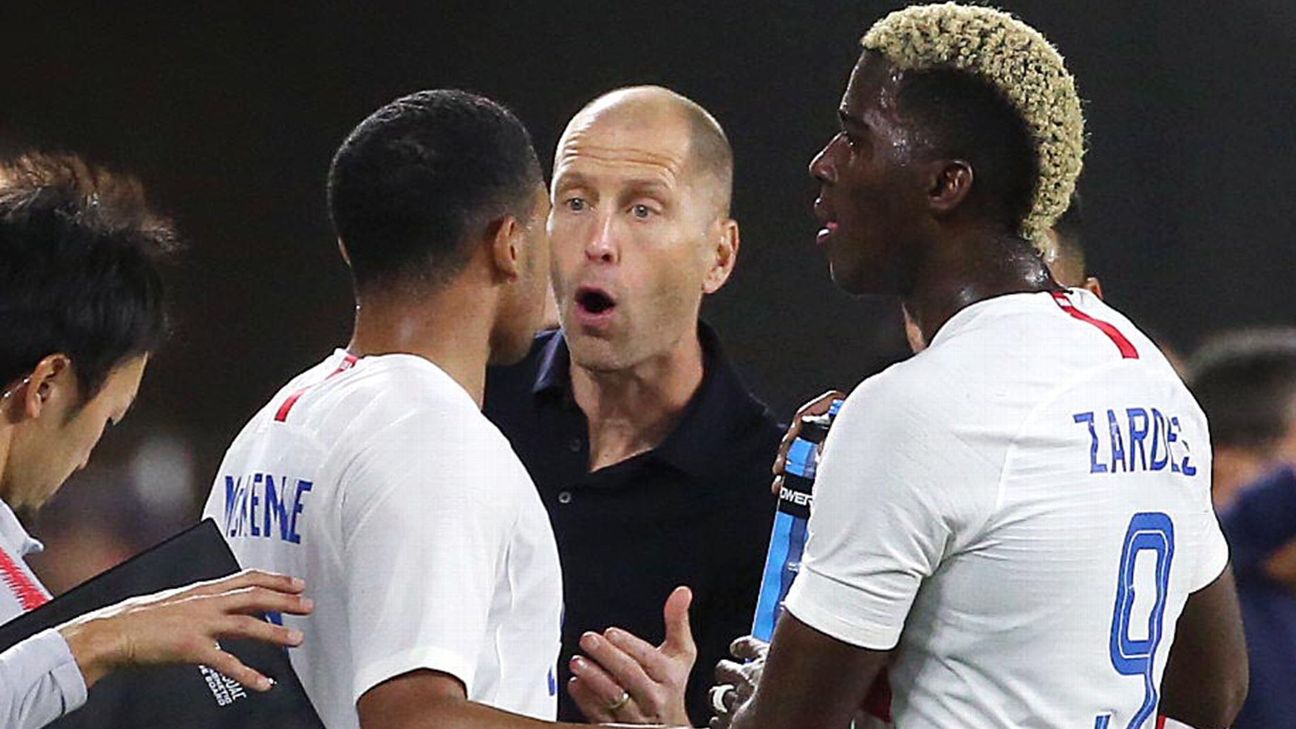ORLANDO — Gregg Berhalter said prior to Thursday’s friendly against Ecuador that the United States’ performance wouldn’t be perfect. After his team’s 1-0 victory, he called the win “a good step.” The U.S. manager was right on both counts.
The U.S. victory contained few moments to get fans out of their seats and was even dull at times. Despite having a sizable possession advantage of 61.4 percent to 38.6, chance creation was at a premium, with the U.S. managing just five shots the entire game. The second half in particular saw the U.S. lose much of its fluidity and rhythm after Christian Pulisic, Wil Trapp and Weston McKennie were substituted.
But for several players, Thursday’s match was their first under Berhalter, and one in which they only had three days to prepare. Even for those players who took part in the January camp, there were still bound to be some hiccups adjusting to the U.S. manager’s tactical approach. This was a match in which the players had to endure some growing pains in the hope that they can play more instinctively down the line.
“Look, the majority of us got in Sunday. For those that weren’t in the January camp, you’re overloaded with information,” said midfielder Trapp who, after playing under Berhalter at the club level, knows better than most the challenge of adapting to his system.
“It’s difficult. But knowing how much information that was thrown at them, and how they adapted, I think it was a fantastic performance from executing and understanding.”
U.S. Player Ratings: Adams adapts seamlessly to new role
This match was about building blocks, and the ones laid down were certainly visible. The backline in particular looked sharp and moved the ball with ease. While there were a few nervous moments when Ecuador broke out in transition, there always seemed to be an extra U.S. defender nearby to kick the ball away and defuse the attack.
As for the attack, it showed some flashes of creativity. An intricate sequence in the 26th minute involving Pulisic, McKennie and Gyasi Zardes ended with Paul Arriola having a clear look at goal, only for his shot to be saved by Ecuadoran keeper Alexander Dominguez. But overall, the U.S. struggled to finish off its solid approach work with clear looks at goal.
“When we do get the ball wide, and we get in crossing situations, are we putting in the right crosses?” Trapp asked. “The once chance we had in the first half, I think we could have rewarded ourselves for a good spell of play.
“But it’s really just about getting behind their defensive line. The more we can do that, the more we have numbers in the penalty box, and it’s just about the quality of the ball.”
It was fitting then that the lone U.S. goal came courtesy of a fluke, with Zardes’ 81st minute effort taking a hefty deflection off Robert Arboleda, looping over Dominguez, caroming off the crossbar and going in. The U.S. was more than happy to accept the gift.
“We created a number of half-chances that should have amounted to more,” Berhalter said. “Overall, when you look at the amount of information we have given the guys in the last two days, we are pleased with the performance. It’s a good starting point for this group.”
The U.S. fans weren’t looking for starting points, what they were wanting was inspiration, especially with Pulisic, McKennie and Tyler Adams starting a game together for the first time in their senior national team careers. All three endured some ups and downs.
Pulisic had some effective touches but was shackled by an Ecuador side intent on forcing another U.S. player to beat them. Adams, playing the hybrid right-back/center-mid role for the first time, was Mr. Clean on the ball, but he looked indecisive when asked to defend in transition.
“It was difficult for me, because the tendency with my club is to counterpress, and run at the ball as soon as we lose it,” Adams said. “I just found myself in the middle of the field more than out wide. The natural idea for me to turn around and cover wasn’t there, but I knew I had Aaron [Long] behind me, so I was a little more comfortable.”
The biggest down of all was suffered by McKennie, though it had nothing to do with his play. Midway through the second half he fell awkwardly while challenging for an aerial ball and badly sprained his ankle. Berhalter said McKennie will undergo an MRI and an X-ray to determine the extent of the damage. That said, it seems a near certainty that the Schalke midfielder will have to sit out Tuesday’s clash with Chile.
The night did have a few players who helped their respective causes. Trapp was sharp in his distribution and pried open the Ecuador defense a few times with diagonal passes to Arriola. He even managed to survive a hair-raising challenge from Beder Caicedo late in the first half, though it eventually forced him from the match. Both John Brooks and Long were exceptional in the center of defense.
The challenge now is to keep progressing. The inclination is to think that it will continue, but that isn’t guaranteed, especially against a Chile side with a well-earned reputation for making life difficult for opponents. Yet Thursday’s match revealed that the U.S. can create problems of its own.
The Berhalter era is off to a solid start.
